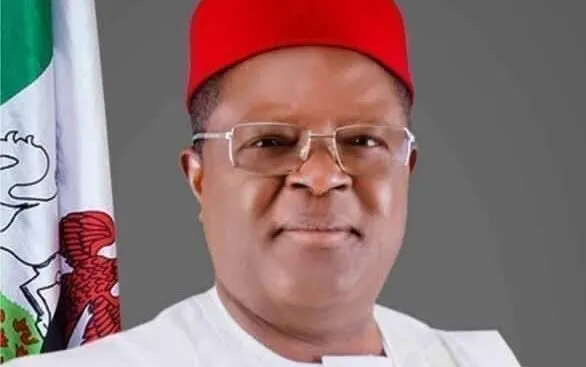The Minister of Works, David Umahi, has justified the federal government’s decision to borrow money from international financial institutions to fund road projects in Nigeria.

Despite growing concerns over Nigeria’s rising debt profile, Mr Umahi insisted that borrowing remains necessary due to inadequate budgetary allocations for infrastructure development.
He stated this on Friday in Abuja, during a budget defence session with the Senate Committee on Works.
Nigeria’s debt profile
Nigeria’s debt profile is made up of domestic and external debts, owed by the federal and state governments. The debts are used to finance the budget deficit and other government expenditures.
In June 2024, the Debt Management Office (DMO) said Nigeria’s public debt was ₦121.67 trillion, equivalent to $91.46 billion, which is a burden of over N600,000 per Nigerian citizen.
Successive governments in Nigeria borrowed to finance projects, even while struggling to settle the existing debts.
There was a large-scale borrowing to fund the 2024 budget deficit. The debt has grown rapidly, putting pressure on the economy and raising concerns about poverty, healthcare, and education.
President Bola Tinubu in a media chat last December said his government took decision to take loans from international financial institutions, not to inflict pain on Nigerians, but because of his commitment to infrastructural development.
The president said borrowing is not crime and that there are many decayed infrastructure that needed funding.
Tinubu inherited 2,064 uncompleted projects
During the budget defence, Mr Umahi a former governor of Ebonyi State, echoed Mr Tinubu’s position on the need to borrow to finance infrasturctural projects, especially roads.
He said Mr Tinubu’s administration inherited about 2,064 uncompleted projects worth N13 trillion and that the funds to complete these projects could not be sourced elsewhere other than borrowing.
“Remember the president inherited 2,064 projects, totaling N13 trillion, and if you review that project in line with the market realities now, it should be close to N18 trillion now.
“And so, when the president, who is an economist, who has gone through all the segments of what we are passing through by reason of his experience, is making efforts to borrow money to do these projects, then the public will be doubting our knowledge,” he said.
Roads conditions increase economic activities
The minister maintained that Nigeria’s economy will be developed and hunger will be reduced when roads are in good condition because it will drive increase in economic activities.
“The roads, when fixed, are catalysts to economic growth and they also eliminate hunger because road infrastructure activities create a lot of economic activities,” he added.
Mr Umahi, thereafter, urged Nigerians to support President Tinubu’s plan for borrowings because the yearly budgetary allocations cannot resolve the country’s infrastructure decay.
“So we need to give attention and encourage Mr. President to borrow money. He cannot manufacture money. He has to be encouraged.
“When a man is trying to put money in your pocket, you say he is trying to steal your money. That is very discouraging. So road infrastructure cannot be fixed by mere yearly budgetary provisions. It has to be given plenty of attention. Thank you very much,” he said.
N827 billion not enough
Chairman of the Senate Committee on Works, Barinada Mpigi, agreed with Mr Umahi on the need for more borrowings.
Mr Mpigi, who represents the Rivers South East Senatorial District, commended the minister for making use of the N827 billion appropriated for the Works ministry in the 2024 budgetary allocations.
He however expressed optimism that the National Assembly will consider increasing allocations of the ministry in the 2025 budget.
Other lawmakers who contributed to the discussion also commended the minister.
All the lawmakers agreed that the federal government needs additional borrowings to complete ongoing projects.
National Assembly approving loans
In November, the two chambers of the National Assembly granted President Tinubu permission to obtain a $2.209 billion external loan, equivalent to N1.767 trillion.
The loan was part of the funds used to finance the 2024 budget.
The year was about to end when the loan was approved though the federal lawmakers later extended capital component of the 2024 budget till 30 June, 2025.
Since the approval, many Nigerians have criticised the Tinubu administration for taking more loans while struggling to pay the existing ones.
The loan was among many others that the administration has obtained with the approval of the legislature since the president assumed office in 2023.